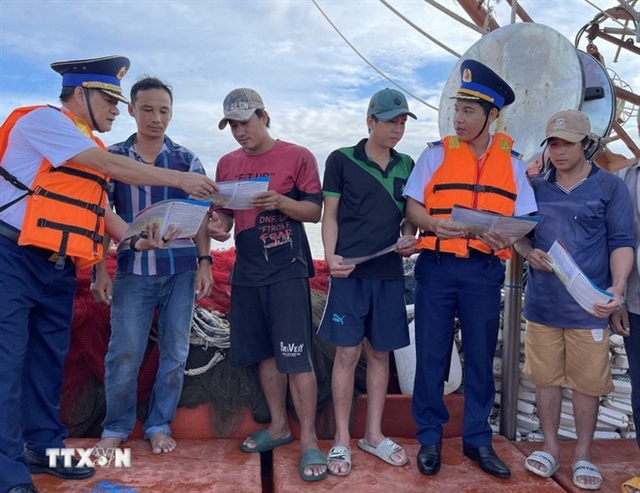 Society
Society


|
| Fishermen in HCM City are given information on illegal, unreported and unregulated (IUU) fishing and sustainable fisheries. — VNA/VNS Photo |
HÀ NỘI — In a major push to combat illegal, unreported and unregulated (IUU) fishing and promote the development of sustainable fisheries in Việt Nam, localities nationwide have deployed inspection teams, tightened control of fishing fleets and worked to handle violations and accelerate the digitalisation of fisheries data.
According to the Ministry of Agriculture and Environment (MAE), the system for managing and monitoring fishing vessels has now been upgraded and more than 8,000 vessels have been registered on VNFishbase, the national fisheries database.
Data has also been merged with the VNeID electronic identification app as well as vessel monitoring (VMS) and electronic seafood traceability (eCDT) systems, helping with monitoring and management.
With many substantive improvements in the control and traceability of fishing vessels across localities nationwide, the EU has acknowledged and commended Việt Nam's efforts.
The MAE has also recently cooperated with the People’s Committee of Đà Nẵng to inaugurate and start operating the upgraded and expanded Thọ Quang Fishing Port.
A national key project in the fisheries sector, the port has a total investment of VNĐ248 billion (US$9.4 million).
Thọ Quang is a major port for Đà Nẵng’s fisheries and plays an especially important role not only for the central region, but also for the whole country.
Completing the port upgrade is a vital part of Việt Nam’s goal to combat IUU fishing.
Managing and monitoring fishing vessels, tracing seafood products and supervising loading and unloading activities at the port will be crucial for controlling IUU fishing, helping improve transparency and meet recommendations of the European Commission (EC), paving the way for the removal of the IUU 'yellow card' this year.
In the next few months, the MAE will continue working closely with coastal localities to complete a fisheries infrastructure system, including fishing ports, storm shelter anchorages, fisheries logistics services, environmental treatment systems and IUU monitoring, helping build a modern and sustainable blue economy.
Minister of Agriculture and Environment Trần Đức Thắng recently held a meeting with the EU Delegation to Việt Nam led by Ambassador Julien Guerrier. The meeting demonstrated Việt Nam’s good faith in working with the EU to resolve obstacles in the circulation of agricultural, forestry and fishery products, combat IUU fishing, comply with EU anti-deforestation regulations and further strengthen Việt Nam–EU cooperation in the sector.
Thắng said that in recent years, the Prime Minister has often directed ministries, sectors and the 21 coastal provinces to strictly implement a wide range of anti-IUU measures.
Việt Nam’s legal framework for fisheries has now been completed with consultation from the EC and has incorporated international regulations, especially EC recommendations on anti-IUU fishing measures.
On the basis of these achievements, Thắng proposed that the EU organise the 5th EC Inspection Mission to Việt Nam to directly review the improvements in combatting IUU fishing and enable the removal of the 'yellow card' at the earliest opportunity.
For its part, the EU also expressed appreciation for Việt Nam’s progress in implementing EC recommendations from central to local levels.
“The EU recognises many substantive changes in the control and traceability of fishing vessels, the expansion of forest areas and the restoration of natural forests,” said Guerrier.
Localities’ efforts
Under the PM's request, localities must promptly end 'fishing at all costs' and build a culture of 'responsible fishing', with proper traceability for the sustainable development of the fisheries sector and to uphold the honour of the nation and people.
Leaders of ministries, sectors and coastal localities bear direct responsibility before the Government and the PM if violations recur or progress towards removing the IUU 'yellow card' is delayed.
Coastal localities nationwide have deployed inspection forces, tightened fleet control, strictly handled violations and accelerated the digitalisation of fisheries data in just the past week.
Currently, HCM City still has 286 vessels that do not meet operational requirements. All of these vessels have been mapped, gathered in their respective wards and communes and divided into groups for convenient supervision.
The city has also encouraged local residents to participate in monitoring vessels under surveillance through soft-measure approaches.
A notable initiative is the 'morning coffee with fishermen' or 'breakfast with fishermen' model, through which local authorities and law enforcement officers engage vessel owners in direct dialogue.
With such practical measures and strong support from vessel owners, the city has recently reported no cases of vessels losing VMS connection or leaving designated anchorages without permission.
The city’s management approach combines deterrence, persuasion and technical supervision to prevent non-compliant vessels from going to sea, while improving fishermen’s awareness of regulations.
It is an effective model that links authorities, technology and communities, contributing positively to combatting IUU fishing in the city.
Meanwhile, Vĩnh Long Province has also taken decisive measures against IUU fishing by strictly controlling all vessels departing and entering ports, reviewing the entire fleet and completing the licensing of all eligible vessels.
Statistics show that 2,628 vessels have undergone registration and inspection, or 100 per cent of active vessels.
Along with registration and inspection, the province is also monitoring its entire offshore fleet through the installation of monitoring systems.
To date, most Vietnamese fishing vessels have installed VMS devices, with the remaining vessels currently inactive and under close supervision. — VNS




